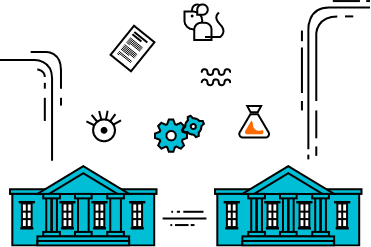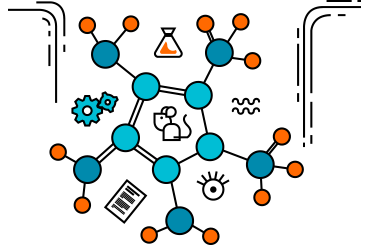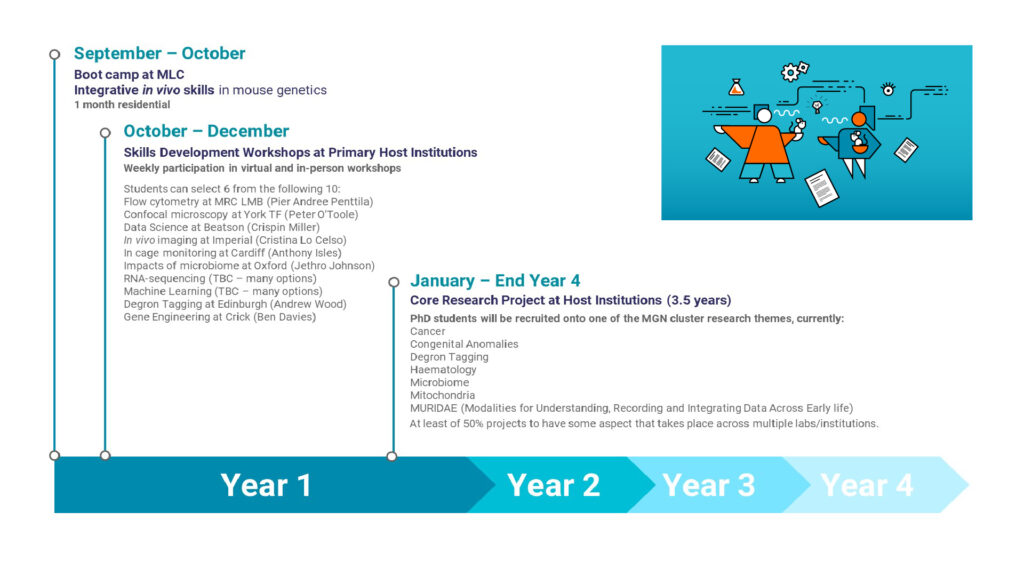
The following sets out the key features and benefits of a multi-disciplinary Research Network-based Doctoral training programme (RND). We envision this programme to be an exciting addition to the MRC National Mouse Genetics Network (NMGN), that will train the next generation of disease modellers for clinical impact.
Background – MRC National Mouse Genetics Network (NMGN)
The MRC NMGN consists of multiple disease-focused clusters pursuing distinctive, but complementary, challenge-led research questions and the Mary Lyon Centre (MLC) at MRC Harwell, which acts as a central hub for specialised technologies and expertise in mouse genetics. Launched in April 2022, the Network is initially funded for five years up to April 2027 with the expectation that it will be renewed for a further five-year period if successful. An Executive Board consists of Network Director Prof. Owen Sansom and MLC Director Dr. Sara Wells in addition to members from each cluster. The full network regularly meets at both formal annual meetings and at broader engagement events with both academia and industry. Currently the network consists of over 50 funded PIs and over 200 Associates. There are already >50 early career researchers associated with Network projects, a number likely to further grow as the Network becomes more established.
Unlike Post Doctoral Research Assistants (PDRAs) and Technicians who are often employed on the network grant, however, there is no mechanism for directly involving or funding Network associated doctoral students which results in a training and skills gap. We therefore propose the creation of an RND for the National Mouse Genetics Network.

Key advantages of our RND model over traditional DTPs
- Creates a national network of discipline-linked PhD students
- Attracts investment in developing core skills in areas of skills shortage
- Democratises access to skills, training and knowledge
- Directly speaks to the MRC EDI objectives of diversity, connectivity, resilience, engagement by developing a cohort of peer-supported network PhDs
- Linkage to NMGN cluster research programmes gains PI buy-in for training and reduces reliance on single PI model
- Increases cross-fertilisation and knowledge exchange across multiple environments
- Reduced staff workload through resource sharing and scaled training across partners
- Leverages/links into other NMGN early career researchers and staff speaking to Technician Commitment and skills development objectives.
A Unique Model for Ancillary Funding
- attract investment from charities/industry supporting research in each core area
- develop internationally competitive training courses based at national centres of excellence (e.g., Mary Lyon Centre)
- generate revenue from a major national/international meeting portfolio

Direct alignment with recent National Strategic Development Plans
People and Careers – training embedded within large networks of focused researchers
Places – RNDs will work across institutions, linked by strong research relationships
Ideas – Projects will be directly linked into world class UK-based science
Innovation – exposure to wider networks in focused areas, often with industry partners
Impact – will accelerate the impact of the research networks by providing key ideas/people
Proposed structure of NMGN RND
“Boot Camp”
With each cohort of incoming PhD students, a 1-month residential boot camp at the MLC followed by two months of skills development workshops will be undertaken to embed core skills and to build network camaraderie.[1] The overall goal is to create a cohort of doctoral students with advanced knowledge of mouse genetics, genome manipulation, and preclinical development of novel therapeutics.
- Integrative in vivo skills in mouse genetics (residential at MLC)
- Data integration/analysis (1-3 day workshops based at MGN Hubs). Custom training based on established course structures (e.g. York)
- Preclinical lab skills – cell/molecular assays, drug screening, etc. These will be hosted by cluster lab members on topics of broad interest (scRNAseq, behavioural assays, high throughput screening, data science approaches)
[1] We estimate the cost of the boot camp as £5k per student with £1-2k additional costs to attend workshops in the following two months.
Core Research Project (3.5 years)
PhD students will be recruited onto one of the MGN cluster research themes (currently Cancer, Congenital Anomalies, Degron Tagging, Haematology, Microbiome, Mitochondria, MURIDAE (Modalities for Understanding, Recording and Integrating Data Across Early life) and Aging). Individual cluster leads and their management teams will determine projects that are most suitable and specify whether projects will be based at single institutions or multiple institutions. We will aim for at least 50% of PhD student projects to have some aspect of their project take place across multiple labs/institutions to further increase knowledge transfer and network cohesion.

Regular workshops in areas of key skills development (throughout degree)
We believe that a well-trained workforce is required to accelerate our translational research agenda to grow the knowledge economy. Therefore, following the boot camp, our programming will continue with a wide range of regular seminars and workshops to develop new skills and give exposure to career opportunities beyond their PhDs. These will cover three key pillars of activity:
- Core Skills for Academia
- Foundational Skills for Industry
- Art of Clinical Translation
Cohort Building and early career researcher (ECR) involvement
We will host an annual meeting focused on ECRs and their contributions to the research network. In addition to sharing their specific research projects, we will run add-on skills workshops, professional development workshops, and undertake cohort-building activities with senior leaders in the research network. These activities will be run by an ECR training committee with a Chair and Vice-Chair selected from within network ECRs. The anticipated intake of 8-10 PhD students per year across the network will form a core group of ECRs and all members of the ECR community would be attached to at least one of four themes:
- Disease modelling (including core mouse genetics, organoids, etc.)
- Data science (understanding large data sets)
- Technologies in genome/molecule manipulation (e.g., CRISPR/Cas9, prime editing, base editing, integrases, nucleic acid delivery)
- Ethics, legal, and social (around translational research involving mice and alternatives)